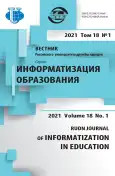Research on the differences of students’ learning styles and knowledge integration in SPOC learning: a case study of course “Basic Portuguese”
- Авторлар: Hu J.1, do Carmo Vieira S.M.2
-
Мекемелер:
- Nankai University
- NOVA University Lisbon
- Шығарылым: Том 18, № 1 (2021)
- Беттер: 12-26
- Бөлім: DIDUCTIC ASPECTS OF EDUCATION INFORMATIZATION
- URL: https://journal-vniispk.ru/2312-8631/article/view/321203
- DOI: https://doi.org/10.22363/2312-8631-2021-18-1-12-26
- ID: 321203
Дәйексөз келтіру
Толық мәтін
Аннотация
Problem and goal. With the advent of the information age, Internet-based online learning has also become one of the learning methods chosen by many learners. They can use these online learning platforms to complete knowledge construction while learning offline. Methodology. Most studies of learning behaviors focus on the discovery of the best learning model and disregard the possible impact of different learning behaviors on knowledge construction. Therefore, based on the Felder - Silverman learning style model, this article uses the Solomon learning style scale to improve the design of the questionnaire and collect four-dimensional differential learning behaviors data. In order to further understand the influence of learning styles on the effectiveness of online learning, we also use online learning data on the Small Private Online Course platform and general cognitive intelligence knowledge integration theory to clarify the relation between learning modes and individuals’ differences. Results. This study observes and analyzes the learning behavior data of 46 students of Nankai University in the SPOC learning platform, also analyzes the differences in learning styles and knowledge construction of students in the SPOC environment. Compared with the traditional “Basic Portuguese” teaching method, the blended teaching model based on the Chaoxing Learning platform has unparalleled advantages. Interactions inside and outside the classroom, improving student participation and promoting teaching diagnosis. Conclusion. Through a comprehensive analysis of questionnaire data and online data, we found that some learning styles have different effects on the effectiveness of online learning, ignoring the individual differences of learners will still cause problems in knowledge construction.
Негізгі сөздер
Авторлар туралы
Jing Hu
Nankai University
Хат алмасуға жауапты Автор.
Email: hujingzinha@hotmail.com
PhD in Educational Sciences, lecturer, Head of the Department of Portuguese of Nankai University, researcher of the Interdisciplinary Center for Social Sciences (CICS.NOVA).
94 Weijin Rd, Nankai District, Tianjin, 300071, People's Republic of ChinaSilva do Carmo Vieira
NOVA University Lisbon
Email: carmo.vs@fcsh.unl.pt
retired assistant professor of the Faculty of Social and Human Sciences of the Nova University of Lisbon, researcher of the Interdisciplinary Center for Social Sciences (CICS.NOVA).
26C Avenida de Berna, Lisbon, 1069-061, Portuguese RepublicӘдебиет тізімі
- Fox A. From MOOCs to SPOCs. Communications of the ACM. 2013;56(12):38-40.
- Kang SM. On learning style. Shandong Foreign Languages Journal. 2006;(3):24-28.
- Zhang M, Zhu J, Zou Y, Yan H, Hao D, Liu C. Educational evaluation in the PKU SPOC course “Data structures and algorithms”. L@S’15: Proceedings of the Second (2015) ACM Conference on Learning @ Scale. Vancouver: ACM; 2015. p. 237-240.
- Wang X, Wen M, Rosé CP. Towards triggering higher-order thinking behaviors in MOOCs. Proceedings of the Sixth International Conference on Learning Analytics & Knowledge. 2016;(4):398-407.
- Zhang W, Tao Y L. Research on flipped class of English major based on SPOC. Foreign Language Teaching. 2017;(2).
- Jiang YY. Discussion on the feasibility of “Online + Offline” blended teaching in college English. Journal of Higher Education. 2018;(7):86-88.
- Liu J, Yang J, Liao XH, Su H, Yang J. Research on the differences of learner knowledge integration in SPOC learning. China Distance Education. 2019;(1):36-46.
- Alesandrini K, Larson L. Teachers bridge to constructivism. The Clearing House: Journal of Educational Strategies, Issues and Ideas. 2010;75(3):118-121.
- Hannon B, Daneman M. A new tool for measuring and understanding individual differences in the component processes of reading comprehension. Journal of Educational Psychology. 2001;93(1):103.
- Zhao DF, Zhu MM, Yang J. Research on the evolutionary personal knowledge graph construction and cognitive evaluation model. Modern Distance Education Research. 2017;146(2):95-103.
- Keefe JW. School applications of the learning style concept: student learning styles. Reston, VA: National Association of Secondary School Principals; 1979.
- Dembo MH, Howard K. Advice about the use of learning styles: a major myth in education. Journal of College Reading and Learning. 2007;37(2):101-109.
- Coffield F, Moseley D, Hall E, Ecclestone K. Learning styles and pedagogy in post-16 learning: a systematic and critical review. 2004. Available from: https://nwresearch.wikispaces.com/file/view/Coffield%20learning%20styles.pdf/246502619/Coffield%20learning%20styles.pdf (accessed: 05.09.2020).
- Akbulut Y, Cardak CS. Adaptive educational hypermedia accommodating learning styles: a content analysis of publications from 2000 to 2011. Computers & Education. 2012;(58):835-842.
- Brown PF, Della Pietra VJ, deSouza PV, Lai JC, Mercer RL. Class-based n-gram models of natural language. Computational Linguistics. 1992;18(4):467-479.
- Alshammari M, Anane R, Hendle RJ. An e-learning investigation into learning style adaptivity. The 48th Hawaii International Conference on System Sciences (HICSS-48). 2015;11-20.
- Liegle JO, Janicki TN. The effect of learning styles on the navigation needs of web-based learners. Computers in Human Behavior. 2006;(22):885-898.
- Feldre RM, Silverman LK. Learning and teaching styles in engineering education. Engineering Education. 1988;78(7):674-681.
- Filippidis SK, Tsoukalas IA. On the use of adaptive instructional images based on the sequential-global dimension of the Felder - Silverman learning style theory. Interactive Learning Environments. 2009;17(2):135-150.
Қосымша файлдар









